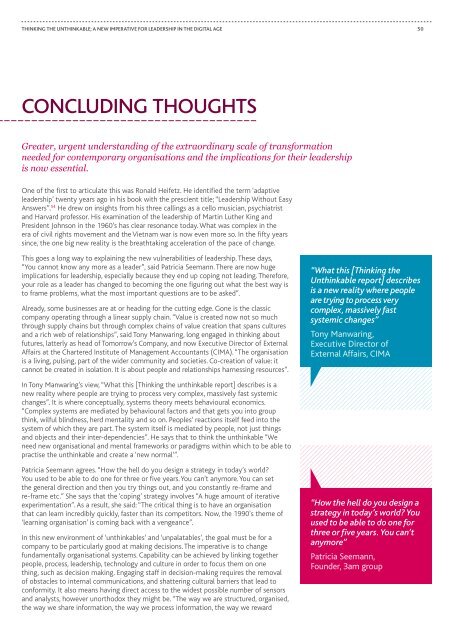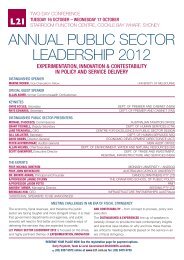Thinking the Unthinkable
Thinking-the-Unthinkable-cima-report
Thinking-the-Unthinkable-cima-report
You also want an ePaper? Increase the reach of your titles
YUMPU automatically turns print PDFs into web optimized ePapers that Google loves.
THINKING THE UNTHINKABLE; A NEW IMPERATIVE FOR LEADERSHIP IN THE DIGITAL AGE<br />
50<br />
CONCLUDING THOUGHTS<br />
Greater, urgent understanding of <strong>the</strong> extraordinary scale of transformation<br />
needed for contemporary organisations and <strong>the</strong> implications for <strong>the</strong>ir leadership<br />
is now essential.<br />
One of <strong>the</strong> first to articulate this was Ronald Heifetz. He identified <strong>the</strong> term ‘adaptive<br />
leadership’ twenty years ago in his book with <strong>the</strong> prescient title; “Leadership Without Easy<br />
Answers”. 54 He drew on insights from his three callings as a cello musician, psychiatrist<br />
and Harvard professor. His examination of <strong>the</strong> leadership of Martin Lu<strong>the</strong>r King and<br />
President Johnson in <strong>the</strong> 1960’s has clear resonance today. What was complex in <strong>the</strong><br />
era of civil rights movement and <strong>the</strong> Vietnam war is now even more so. In <strong>the</strong> fifty years<br />
since, <strong>the</strong> one big new reality is <strong>the</strong> breathtaking acceleration of <strong>the</strong> pace of change.<br />
This goes a long way to explaining <strong>the</strong> new vulnerabilities of leadership. These days,<br />
“You cannot know any more as a leader”, said Patricia Seemann. There are now huge<br />
implications for leadership, especially because <strong>the</strong>y end up coping not leading. Therefore,<br />
your role as a leader has changed to becoming <strong>the</strong> one figuring out what <strong>the</strong> best way is<br />
to frame problems, what <strong>the</strong> most important questions are to be asked”.<br />
Already, some businesses are at or heading for <strong>the</strong> cutting edge. Gone is <strong>the</strong> classic<br />
company operating through a linear supply chain. “Value is created now not so much<br />
through supply chains but through complex chains of value creation that spans cultures<br />
and a rich web of relationships”, said Tony Manwaring, long engaged in thinking about<br />
futures, latterly as head of Tomorrow’s Company, and now Executive Director of External<br />
Affairs at <strong>the</strong> Chartered Institute of Management Accountants (CIMA). “The organisation<br />
is a living, pulsing, part of <strong>the</strong> wider community and societies. Co-creation of value: it<br />
cannot be created in isolation. It is about people and relationships harnessing resources”.<br />
“What this [<strong>Thinking</strong> <strong>the</strong><br />
<strong>Unthinkable</strong> report] describes<br />
is a new reality where people<br />
are trying to process very<br />
complex, massively fast<br />
systemic changes”<br />
Tony Manwaring,<br />
Executive Director of<br />
External Affairs, CIMA<br />
In Tony Manwaring’s view, “What this [<strong>Thinking</strong> <strong>the</strong> unthinkable report] describes is a<br />
new reality where people are trying to process very complex, massively fast systemic<br />
changes”. It is where conceptually, systems <strong>the</strong>ory meets behavioural economics.<br />
“Complex systems are mediated by behavioural factors and that gets you into group<br />
think, wilful blindness, herd mentality and so on. Peoples’ reactions itself feed into <strong>the</strong><br />
system of which <strong>the</strong>y are part. The system itself is mediated by people, not just things<br />
and objects and <strong>the</strong>ir inter-dependencies”. He says that to think <strong>the</strong> unthinkable “We<br />
need new organisational and mental frameworks or paradigms within which to be able to<br />
practise <strong>the</strong> unthinkable and create a ‘new normal’”.<br />
Patricia Seemann agrees. “How <strong>the</strong> hell do you design a strategy in today’s world?<br />
You used to be able to do one for three or five years. You can’t anymore. You can set<br />
<strong>the</strong> general direction and <strong>the</strong>n you try things out, and you constantly re-frame and<br />
re-frame etc.” She says that <strong>the</strong> ‘coping’ strategy involves “A huge amount of iterative<br />
experimentation”. As a result, she said: “The critical thing is to have an organisation<br />
that can learn incredibly quickly, faster than its competitors. Now, <strong>the</strong> 1990's <strong>the</strong>me of<br />
‘learning organisation’ is coming back with a vengeance”.<br />
In this new environment of ‘unthinkables’ and ‘unpalatables’, <strong>the</strong> goal must be for a<br />
company to be particularly good at making decisions. The imperative is to change<br />
fundamentally organisational systems. Capability can be achieved by linking toge<strong>the</strong>r<br />
people, process, leadership, technology and culture in order to focus <strong>the</strong>m on one<br />
thing, such as decision making. Engaging staff in decision-making requires <strong>the</strong> removal<br />
of obstacles to internal communications, and shattering cultural barriers that lead to<br />
conformity. It also means having direct access to <strong>the</strong> widest possible number of sensors<br />
and analysts, however unorthodox <strong>the</strong>y might be. “The way we are structured, organised,<br />
<strong>the</strong> way we share information, <strong>the</strong> way we process information, <strong>the</strong> way we reward<br />
“How <strong>the</strong> hell do you design a<br />
strategy in today’s world? You<br />
used to be able to do one for<br />
three or five years. You can’t<br />
anymore”<br />
Patricia Seemann,<br />
Founder, 3am group



